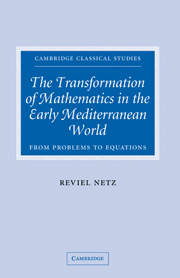1 - The problem in the world of Archimedes
Published online by Cambridge University Press: 05 May 2010
Summary
In this chapter I discuss the Archimedean problem in its first, “Classical” stage. In section 1.1, I show how it was first obtained by Archimedes and then, in 1.2, I offer a translation of the synthetic part of Archimedes' solution. Following that, section 1.3 makes some preliminary observations on the geometrical nature of the problem as studied by Archimedes. Sections 1.4 and 1.5 follow the parallel treatments of the same problem by two later Hellenistic mathematicians, Dionysodorus and Diocles. Putting together the various treatments, I try to offer in section 1.6 an account of the nature of Ancient geometrical problems. Why were the ancient discussions geometrical rather than algebraic – why were these problems, and not equations?
The problem obtained
In his Second Book on the Sphere and Cylinder, Archimedes offers a series of problems concerning spheres. The goal is to produce spheres, or segments of spheres, defined by given geometrical equalities or ratios. In Proposition 4 the problem is to cut a sphere so that its segments stand to each other in a given ratio. For instance, we know that to divide a sphere into two equal parts, the solution is to divide it along the center, or, in other words, at the center of the diameter. But what if want to have, say, one segment twice the other?
- Type
- Chapter
- Information
- The Transformation of Mathematics in the Early Mediterranean WorldFrom Problems to Equations, pp. 11 - 63Publisher: Cambridge University PressPrint publication year: 2004

